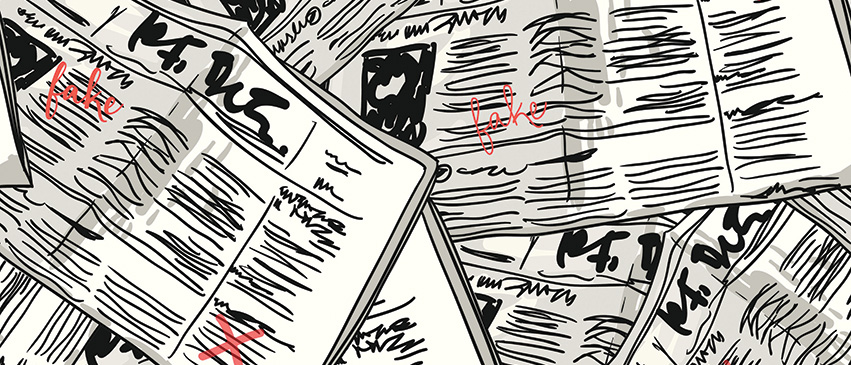
In the early days of COVID-19, the World Health Organization’s Director-General summed up the crux of the crisis in one simple sentence: “We’re not just fighting an epidemic; we’re fighting an infodemic.”
This pandemic is the first in history in which technology and social media are being used on a massive scale to spread misinformation and disinformation. Be it misguided or malicious, the lightning spread of “fake news” happens because of how easy technology has made it to share that so-called news.
What’s missing? A little thought and scrutiny before clicking the share button. As a librarian and information professional, I’ve been observing the decline of information literacy in our country with growing alarm.
Navigating the Information Boom
In 2018, long before our COVID crisis, a team of researchers at MIT Media Lab published a study that examined “some 126,000 stories, tweeted by three million users, over more than 10 years.” It found that “false news travels farther, faster, deeper and more broadly than the truth online in all categories—including business, science and technology, entertainment, terrorism, war and politics.” In fact, falsehoods were 70 percent more likely to be retweeted than the truth, the study found.
It is one of the greatest ironies of this century that while the amount of information available to us increases exponentially, our ability to discern what is bad information gets worse. We are in the midst of a tremendous information boom, and the ability to navigate it successfully is essential if we want to be good citizens and neighbors. Bad actors are hard at work sharing misinformation online in order to confuse and mislead the public. They are even taking advantage of the inherent instability of knowledge in order to mislead us. We must get better at recognizing them and calling them out. This is where we—libraries and librarians—can help.
At the library, we curate and share some of the best information available at any given moment. We subscribe to peer-reviewed journals and trustworthy databases covering a range of topics. We also subscribe to NewsBank and ProQuest Newsstand, two digital services allowing you access to thousands of newspapers around the world. You can read the actual article, not a Facebook fake.
Speaking of Facebook, we can help you fact-check an acquaintance’s Facebook post. It’s our job to help you grow as an information detective.
The Nature of Knowledge
We should all be aware that every piece of media we encounter is guided by the bias of those who created it. Bias is inescapable, but there are definitely degrees—and educated news consumers and critical thinkers learn to detect it. We should also know that a news story evolves as more information is uncovered, and different authors, experts and witnesses contribute to that knowledge.
“News is only the first rough draft of history,” as the late journalist Alan Barth once said. What I see too often, though, is an awareness of the existence of bias leading to a blanket distrust of reliable news resources. Bias exists, yes, but we cannot replace the work of trusted news institutions with Twitter and TikTok.
Knowledge evolves. It is cumulative. Every bit of knowledge we have is built on the work of those who came before, and some portion of what we know now will someday be revealed to be inaccurate as we learn more. That’s the nature of knowing. We act with the best knowledge we have at any given moment.
Building Information Literacy
In that vein of acting on the best knowledge we have, let me share some advice from an expert. Howard Schneider is executive director of Stony Brook University’s Center for News Literacy, a nonprofit committed to teaching students how to use critical thinking to judge the reliability and credibility of news reports and news sources. As the only center of its kind in the U.S., it provides numerous free resources for students, teachers and everyone, actually, at centerfornewsliteracy.org.
In a Newsday editorial earlier this year, Schneider offered several tips, which I’ve summarized as follows:
- Slow down. You may not be able to slow the onslaught of information, but you can control your response. Ask yourself who is sharing the information and why. Check other news sources for consistency of coverage. Read past the headlines. Don’t confuse the sender of the information with the source of the information. Yes, you love and trust your family, but make sure they haven’t been misled into sharing bad information before you share it, too.
- Don’t outsource your judgment. Verify first, last and always before sharing information. Just because something is trending doesn’t mean it’s true. Algorithms, search engine results and viral tweets are indicators that measure popularity, not reliability.
For years, Schneider has noted that one of the most frequently searched websites on Google about Rev. Martin Luther King was MartinLutherKing.org—which is actually run by Stormfront, a white supremacist organization. “Many users were fooled because they wrongly assumed that ‘dot-org’ meant that the site was run by a responsible nonprofit. Anyone can apply to be a dot-com or dot-org. Only a few URLs are restricted, including dot-edu for educational institutions and dot.gov for all legitimate government sites.”
It is my hope that we will learn to be more cautious when encountering outrageous claims on the internet—as well as claims that confirm our own biases. There is too much knowledge for one individual to master it all, so we must look to professionals to help make sense of the world.
Librarians are information professionals. Let us help. PM
Randall Yelverton is executive director of the Peoria Public Library.
- Log in to post comments

